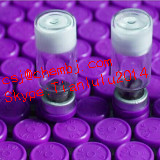| Message: | Oxytocin is produced in the hypothalamus and is secreted into the bloodstream by the posterior pituitary gland. Secretion depends on electrical activity of neurons in the hypothalamus - it is released into the blood when these cells are excited.
The two main actions of oxytocin in the body are contraction of the womb (uterus) during childbirth and lactation. Oxytocin stimulates the uterine muscles to contract and also increases production of prostaglandins which increase the contractions further. Manufactured oxytocin is sometimes given to induce labour if it has not started naturally or it can be used to strengthen contractions to aid childbirth. In addition, manufactured oxytocin is often given to speed up delivery of the placenta and reduce the risk of heavy bleeding by contracting the uterus. During breastfeeding, oxytocin promotes the movement of milk into the breast, allowing it to be excreted by the nipple. Oxytocin is also present in men, playing a role in sperm movement and production of testosterone by the testes.
More recently, oxytocin has been suggested to be an important player in social behaviour.
In the brain, oxytocin acts as a chemical messenger and has been shown to be important in human behaviours including sexual arousal, recognition, trust, anxiety and mother-infant bonding. As a result, oxytocin has been called the 'love hormone' or 'cuddle chemical'.
Many research projects are undertaken, looking at the role of oxytocin in addiction, brain injury, anorexia and stress amongst other topics.
|
 my account
my account
 log out
log out
 my account
my account
 log out
log out
